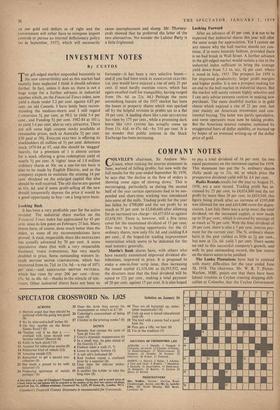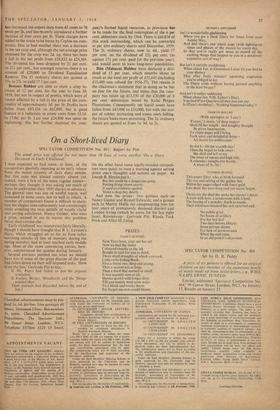COMPANY NOTES
ordinary shares, now only 31s. 6d. and yielding 8.4 per cent., if the hoped-for trading improvement materialises which seems to be indicated for the steel industry generally.
Martin's Bank shares have, with others who have recently announced improved dividend dis- tributions, improved in price. It is proposed to make a one-in-four scrip issue, thus increasing the issued capital £1,319,106 to £6,595,532, and the directors state that the final dividend will be raised to 121 per cent., making a total payment of 20 per cent. against 15 per cent. It is also hoped to pay a total dividend of 16 per cent. (in two equal payments) on the increased capital for 1959. This statement has put the 5s. ordinary shares (fully paid) up to 21s. 6d. at which price the prospective dividend yield will be 4.6 per cent.
Radio Rentals results for the year to August 31, 1958, are a new record. Trading profit has in- creased by 25 per cent. to £4,034,880 and the net profit by more than 30 per cent. to £824,940, this figure being struck after an increase of £195,000 was allowed for tax and £419,000 more for depre- ciation. Last July there was a scrip issue; the total dividend, on the increased capital, is now made up to 20 per cent., which is covered by earnings of as much as"70 per cent. With the final dividend of 10 per cent. there is also a 5 per cent. interim pay- ment for the current year. The 5s. ordinary shares have in the past yielded as little as 2+ per cent., but now at 32s. 6d. yield 3 per cent. There seems no end to this successful company's growth, and with its past outstanding record, the low return on the shares seems to be justified.
The Lanka Plantations have had to contend with many difficulties for the year ended June 30, 1958. The chairman, Mr. W. R. T. Picton- Warlow, MBE, points out that there have been labour troubles in Ceylon creating shipping diffi- culties at Colombo, that the Ceylon Government
has increased the export duty from 65 cents to 70 cents per lb. and has recently introduced a further increase of four cents per lb. These charges have added to the strain to be borne by Ceylon tea com- panies. Due to bad weather there was a decrease in the tea crop and, although the net average price obtained for the crop was 2d. up, there has been a fall in the net profit from £28,832 to £24,569. The dividend has been dropped by 21 per cent. io 221 per cent., but amongst reserves there is an amount of £20,000 to Dividend Equalisation Reserve. The £1 ordinary shares are quoted at 25s. to 27s. to yield" 17.3 per cent.
Broome Rubber are able to shoiv a crop in- crease of 12 per cent, for the year to June 30, 1958, but not in respect of profits, which were of course affected by a fall in the price of the com- modity of approximately 3d. per lb. Profits have fallen from £83,436 to £62,800, but a good feature is a reduction in, estate costs from 15.1d. to 13.8d. per lb. Last year £24.800 was spent on replanting; this has further depleted the com- pany's limited liquid resources, as provision has to be made for the final redemption of the 6 per cent, debenture stock by 1966. There is £66,838 of this stock outstanding, which can be converted at par into ordinary shares until December, 1959. The 2s. ordinary shares, now Is. 6d., yield 17 per cent. on the dividend of 121 per cent. (as against 171 per cent, paid for the previous year), and would seem to have long-term possibilities.
Rim (Malacca) Rubber have declared a divi- dend of 15 per cent, which absorbs about as much as the total net profit of £23,645 (including £15,489 cess refund for 1956-57). The reason is the chairman's statement that in doing so he has no fear for the future, and states that the com- pany has taken up £13,350 of the £20,000 of 8 per cent. debentures issued by Kulai Pergau Plantations. Consequently net liquid assets have fallen from £45,000 to £14,000, but with the out- put of rubber increasing and estate costs falling, the future looks more promising. The 2s. ordinary shares arc quoted at from Is. 9d. to 2s.











































 Previous page
Previous page